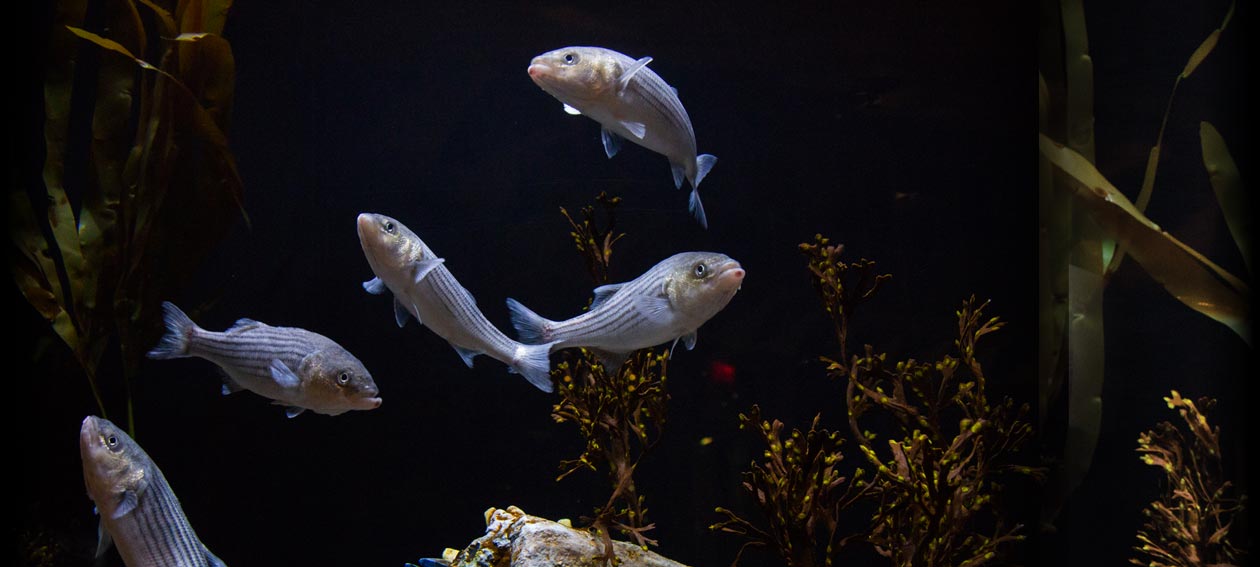In 2008, Sean Grace was helping one of his graduate students with her thesis on kelp growth in Long Island Sound. Back then, finding suitable specimens to study was easy. The region’s kelp beds were abundant and thriving, like a plush and well-maintained lawn carpeting parts of the sound’s rocky coastline.
“The kelp beds were so thick that in some areas you couldn’t put your hand down without putting it on multiple kelps,” recalled Grace, a marine biologist and associate professor of biology at Southern, who has been diving in the sound for two decades.
Today, he doubts he could find enough to adequately conduct the research. “You barely see any kelp out there,” he said.
Kelp is a type of brown algae found in underwater forests.
Grace, who co-directs Southern’s Werth Center for Coastal and Marine Studies, is working to document that dramatic decline, which scientists and divers have been reporting anecdotally over the last several years. He is one of a worldwide network of marine scientists who make up the Kelp Ecosystem Ecology Network, or KEEN, an organization attempting to examine the effects of global climate change on kelp habitats.
Scientists aren’t sure what’s decimating the kelp population in the Sound, but Grace said it is likely rising water temperatures are making the environment too warm for kelp, which prefers colder waters.
Long Island Sound is the southernmost point on the East Coast where kelp beds grow naturally, Grace explained. While kelp beds in waters north of Cape Cod remain healthy and plentiful, once-covered spots in the sound and in Rhode Island’s Narragansett Bay are now bare, except for “a few algae here and there,” Grace said.
Around the world, other coastal spots on the fringes of where kelp beds usually thrive are seeing similar drops, he said.
“When we think about climate change, the oceans are getting warmer and the warmer water from down south is going to start encroaching into Long Island Sound. That’s really going to change the dynamics of the species that are found here,” Grace said. “From a scientist’s standpoint, it’s a really cool natural experiment to watch. But when you think about the effects of it, it’s going to be colossal.”
The decline of the seaweed forests is a huge loss, said Grace, not only for divers who admire their beauty, but for the rich collection of marine life that gets its food and shelter from the kelp beds. Kelp serves as a natural habitat for everything from fish, crabs and urchins to a multitude of invertebrates. It also keeps the Sound healthy by producing oxygen and collecting pollutants from the water, said Grace, who holds both a master’s and a doctoral degree in biological sciences from the University of Rhode Island.
“The greater diversity you have, the healthier the system,” Grace said. “Without these beautiful three-dimensional structures under water, all of those other species will just disappear.”
While some fisherman have been successful growing kelp in Long Island Sound for use in the food industry, the farmed variety does not offer all of the same environmental benefits, he noted. “They’re having great success and that’s good to hear, but these are literally ropes that are seeded with baby kelp and hanging in the water. It’s not a natural kind of setting,” Grace said.
Grace said his research will look at kelp beds throughout the Sound with known kelp habitats, including Branford’s Thimble Islands and spots off the north coast of Long Island. In addition to comparing existing kelp populations to those documented in previous studies, Grace said he will collect data on water temperature, acidity, dissolved oxygen levels and other conditions to try to pinpoint the cause of the decline.
“We’re looking at a whole lot of causes that might be affecting this, anything from temperature changes to an invasive species coming in and out, although we haven’t seen much evidence for that,” Grace said.
Jarrett Byrnes, assistant professor of biology at UMass Boston, and Aaren Freeman, associate professor of biology at Adelphi University in Long Island, are collaborating on the project.
Grace said Southern’s inclusion in the global endeavor is “a major step forward for the sciences” at the university. With 25 percent of the world’s coastlines covered with kelp forests, the research is expected to have far-reaching implications.
“Having a better understanding of what’s taking place when it comes to temperature or anything else we might find is definitely going to have a worldwide effect,” Grace said. “Understanding these ecosystems is really critical to predicting what might happen to them in the future.”


